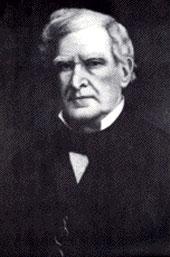Jeremiah S. Black

Jeremiah Sullivan Black (January 10, 1810–August 19, 1883) was an American statesman and lawyer.
He was largely self-educated, and before he was of age was admitted to the Pennsylvania bar. He gradually became one of the leading American lawyers, and from 1851 to 1857 was a member of the supreme court of Pennsylvania, serving as Chief Justice from 1851 to 1854. In 1837 he entered President James Buchanan's cabinet as Attorney General of the United States. In this capacity he successfully contested the validity of the California land claims claims to about 19,000 square miles (49,000 km²) of land, fraudulently alleged to have been granted to land-grabbers and others by the Mexican government prior to the close of the Mexican War. From December 17, 1860 to March 4, 1861 he was U.S. Secretary of State. Perhaps the most influential of President Buchanan's official advisers, he denied the constitutionality of secession, and urged that Fort Sumter be properly reinforced and defended.
President James Buchanan nominated him for a seat on the Supreme Court, but his nomination was defeated in the Senate by a single vote on February 21, 1861. He became reporter of decisions to the Supreme Court of the United States in 1861, but after publishing the reports for the years 1861 and 1862 he resigned, and devoted himself almost exclusively to his private practice, appearing in such important cases before the Supreme Court as the one known as Ex Parte Milligan, in which he ably defended the right of trial by jury, the McCardle case and the United States v. Blyew et al.
After the American Civil War he vigorously opposed the Congressional plan of Reconstruction and drafted President Andrew Johnson's message vetoing the Reconstruction Act of the March 2, 1867. Black was also for a short time counsel for President Johnson, in his trial on the article of impeachment, before the United States Senate, and for William W. Belknap, United States Secretary of War from 1869 to 1876, who in 1876 was impeached on a charge of corruption; and with others he represented Samuel J. Tilden during the contest for the presidency between Tilden and Rutherford B. Hayes. He died at Brockie, Pennsylvania in 1883.
Further Reading
- Black, C. F., Essays and Speeches of Jeremiah S. Black, with a Biographical Sketch, New York: 1885.
This article incorporates text from a publication now in the public domain: Chisholm, Hugh, ed. (1911). Encyclopædia Britannica (11th ed.). Cambridge University Press. {{cite encyclopedia}}: Missing or empty |title= (help)
| Preceded by: Lewis Cass |
United States Secretary of State | Succeeded by: William H. Seward |
| Preceded by: Caleb Cushing |
Attorney General of the United States | Succeeded by: Edwin M. Stanton |
| Preceded by: Benjamin Chew Howard |
Supreme Court of the United States Reporter of Decisions | Succeeded by: John William Wallace |
}
